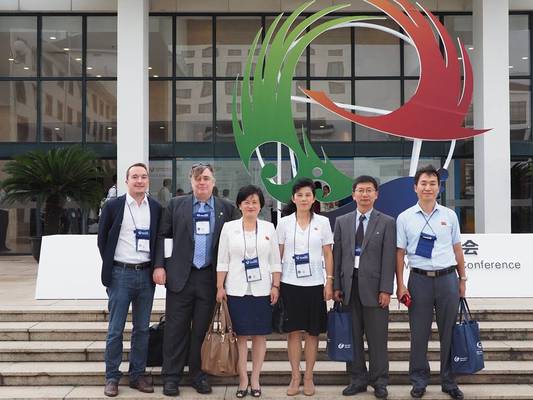Biodiversity and Ecosystem Services under Global Changes – HSF Korea with delegation from DPR Korea at the 10th INTECOL Conference
Between 19th and 24th of September more than 70 sessions on various topics related to wetlands and conservation took place during the 10th INTECOL Conference.
INTECOL is the International Association for Ecology and was founded in 1967 to help coordinate activities among national ecological societies in over 70 countries. Every four years an international congress on ecology takes place. Now for the 10th time. Between 19th and 24th of September more than 70 sessions on various topics related to wetlands and conservation took place.
On September 21st Hanns Seidel Foundation together with the Ramsar Secretariat and the East – Asian Australasian Flyway Partnership hosted a session on 'The Conservation and Wise Use of Wetlands in North-east Asia with focus on the coastal wetlands of the Yellow Sea/West Sea'. The session was moderated by Felix Glenk, Project Manager for DPR Korea of HSF Korea.
The first presentation was held by Dr Lew Young, Senior Regional Advisor for Asia-Oceania of the Ramsar Secretariat on “The Ramsar Convention and the Conservation and Wise Use of Coastal Wetlands”. He gave an overview on Ramsar Sites (Wetlands of International Importance) around the Yellow/West Sea and the value of ecosystem services of tidal-flats.
Spike Millington, Chief Executive of the East – Asian Australasian Flyway Partnership followed with the topic “International Cooperation for a Shared Biodiversity Resource: Migratory Waterbirds in the East Asian – Australasian Flyway”. The EAAF is the flyway with the highest number of IUCN threatened bird species (33) and with the highest number of declining species.
The third presentation was held by Dr Nial Moores of Birds Korea on “Conservation of Yellow Sea Tidal-flats”. He introduced current research results on tidal flat measurements in the Republic of Korea (stating a loss of ~75% of Historical Tidal Flat area) and introduced the work of different NGOs working on biodiversity and tidal flat conservation on the Korean Peninsula.
After the presentations of the Ramsar Secretariat, the EAAFP and Birds Korea, representatives of the national level followed. The status of wetlands in their respective countries were introduced by representatives of the Democratic People´s Republic of Korea, the People´s Republic of China and the Republic of Korea. It was one of the rare opportunities that representatives of all countries neighbouring the Yellow/West Sea discussed the importance and status of the Yellow/West Sea tidal-flats, and explored opportunities for future cooperation of this declining ecosystem.
During the conference the delegation from DPR Korea together with participants of international organizations visited several wetlands in China, including Shanghai Chongming Dongtan National Nature Reserve and Shajiabang National Wetland Park. These excursions had the purpose to demonstrate wetland management in China.
You can read more about the 10th INTECOL Conference here.

